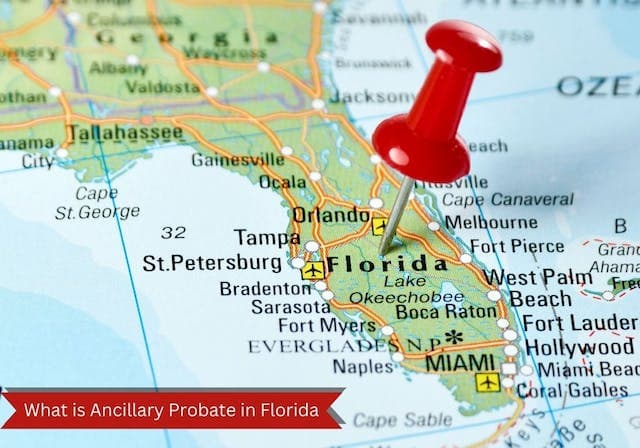
Understanding and Navigating Ancillary Administration in Florida
An ancillary probate is a legal process when an individual dies with properties in many states or dies in one state having properties in another. Ancillary Administration in Florida is required when a non-Florida resident dies and leaves property in Florida. These properties can be assets, Credits to the Florida residents, and liens on the Florida properties. In such cases, an ancillary probate proceeding in Florida is necessary to dispose of the Florida property and settle the probate disputes.
Navigating the Ancillary Administration in Florida is essential when dealing with a deceased individual's assets across multiple states. Understanding this process ensures the rightful distribution of assets and adherence to legal requirements.
- Ancillary administration in Florida is required when a non-Florida resident dies with properties in Florida.
- The descendent must not be a Florida resident and must own property in Florida at the time of the descendent's death.
- The ancillary personal representative must be a Florida resident, Legally 18 years or above, medically capable, and free from felonies and convictions.
- Initiating ancillary probate promptly is crucial to avoid complications and expedite asset distribution.
- Hiring an experienced probate attorney is vital for navigating the complex process efficiently.
For example, let’s say someone lived in New York but owned a vacation home in Florida. When individuals pass away, a will typically dictates the distribution of their property to family members or others.
This distribution happens through a legal process known as probate. Usually, New York would conduct the probate because they lived there.
But, New York’s court does not wield power over real property in Florida. Opening an ancillary probate in Florida is necessary for the appropriate distribution of the Florida house.
It is typically the responsibility of the personal representative or executor (the person named in the will to ensure everything is distributed correctly) to initiate the ancillary probate administration.
They often work with a lawyer in that state because every state has different laws.
Requirements for Ancillary Administration:
Florida's warm weather and serene ambiance make it an ideal destination for retirees and pension holders seeking a comfortable and relaxed lifestyle. While enjoying the beauty and amenities of Florida, many wish to avoid ancillary probate, whether in Florida or elsewhere.
In Florida, ancillary probate of an estate is required only if certain conditions are met:
- Descendent was a Non-Florida Resident: As per the Florida Trust Code (§ 734.102(1)), To qualify for ancillary administration in Florida the descendent must not be a resident of Florida state at the time of the decedent's death
- Died Owning Properties in Florida: Florida Ancillary administration is valid only, If a descendent died owning properties in Florida. Now these properties can be anything such as non-probaet assets in Florida, liens on Florida property, and Credits due from Florida residents.
Ancillary Administration and Florida Probate Law
If a non-resident of Florida dies with property in Florida, including real property, notes or liens, or intangibles in Florida, an Ancillary Probate Administration may be required to properly pass title/ownership of the assets to the decedent’s beneficiaries. See Florida Statute §734.102(1).
How do Ancillary Probate Administrations in Florida Work?
The ancillary administration process in Florida begins with appointing a personal representative or executor authorized to handle the decedent’s real property or assets in Florida.
The process includes filing necessary documents, paying estate debts and taxes, selling the property if needed, and coordinating with beneficiaries to distribute assets.
Performing ancillary administration is essential to safeguard the decedent's interests and ensure the seamless and accurate execution of their wishes.
When Should an Ancillary Probate Administration in Florida Be Filed?
Ideally, the personal representative or executor of the estate should initiate the ancillary probate process as soon as possible after their appointment in the domiciliary proceeding, or the probate proceeding in the decedent’s home state.
It is essential to file the Florida Ancillary Probate Administration promptly to avoid additional complications and potential disputes, as well as to shorten the time taken to distribute the decedent’s assets.
Who is Authorized to Act as a Personal Representative or Executor in a Florida Ancillary Probate Administration?
An ancillary administrator is typically the personal representative or executor designated in the decedent’s will. If there is no will or the named executor is unavailable, the court can choose a personal representative under Florida probate law.
To act as personal representative or executor in an ancillary administration in Florida, the representative must meet specific legal requirements and obtain authorization from the appropriate county circuit court where the real property is located.
Legal Requirements to Act as an Ancillary Personal Representative in Florida
- Residency: The representative must be a legal Florida resident or a close relative of the deceased.
- Age: They must be at least 18 years old.
- Capacity: The representative must be mentally competent and free from legal disabilities.
- No Felony Convictions: They should not have any felony convictions unless their civil rights have been restored.
- Bond: Depending on the circumstances and the decedent's will, the representative may need to obtain a bond unless waived by the court.
- Familiarity with the Law: It's beneficial for the representative to have an understanding of probate law and procedures in Florida.
Florida Ancillary Probate Checklist:
Before starting the ancillary probate process, it is vital to have all the necessary documentation and information available to provide to and discuss with your Florida probate attorney. Below is a checklist that may help:
- Locate the decedent’s original will.
- Obtain a certified death certificate.
- Compile a list of all the decedent’s fundamental properties located in Florida.
- Identify all outstanding debts or claims against the decedent’s estate.
- Consult a qualified florida probate attorney
Important Florida Ancillary Probate Forms:
Key forms required in the ancillary probate process include:
- Petition for Ancillary Administration – The primary document that initiates the process.
- Oath of Personal Representative – A sworn statement made by the personal representative indicating they will fulfill their responsibilities correctly and under Florida law.
- Inventory of the Estate – A comprehensive list of the decedent’s real property or assets in Florida.
- Fiduciary Accounting and Final Distribution documents – Documentation required to conclude the ancillary probate formally.
Other documents that may be needed:
- Letters of Administrations
- Deceased Last Wills and Testament
- Petition to Probate and will administration order
- Death Certificates of the deceased
- Beneficiary Details including name, address, and contact
- Copy of all Florida deeds
- Copies of the tax bills of your Florida real properties
How to file Ancillary Probate in Florida: Step-by-Step procedure
Below is a description of the Ancillary Administration process in Florida:
- For your Ancillary Administration needs, consult a Florida probate attorney specializing in this area. Their expertise and experience will be invaluable.
- File a petition for ancillary administration in the appropriate county circuit court.
- Collaborate with your attorney to prepare a Florida asset inventory.
- Include each asset’s fair market value at the time of the decedent’s death.
- Manage the estate, which may involve maintaining or selling the property, paying taxes, and paying off the decedent’s debts.
- Distribute the remaining assets to the beneficiaries as detailed in the decedent’s will or according to Florida law.
- Once distributions are complete, work with your Probate and Trust Administration Attorney to close the ancillary probate by filing appropriate paperwork with the court.
How Long Does Ancillary Probate Take in Florida?
The duration of ancillary probate in Florida varies from one case to another. It can take anywhere from one month to one year or more. Factors that affect the timeline include:
- The size and complexity of the estate: The administration of an estate depends on its size, whether it is a small estate with few assets or a larger estate. For small estates summary administration is faster and can be done in 2-4 months, whereas for bigger estates formal administration is needed and takes anywhere between 6 months to a year to complete.
- The level of beneficiary cooperation: This is another factor that determines the pace of ancillary administration in Florida. How well the heirs get along can ease the process, fast-forwarding from a year to a few months.
- Potential disputes: Disputes among the beneficiaries can also slow the process. For an effective administration, disputes need to be resolved before entering probate in Florida.
- The court’s docket: The number of pending cases in the probate court plays a vital role in the ancillary administration. The smaller the court's docket the faster will be the ancillary administration.
Ancillary probate typically lasts around 8 to 12 months in many cases. If the decedent passed away more than two years ago, and asset values permit, an abbreviated version of ancillary probate might be an appropriate option. Be aware that more complex cases could extend the duration even longer.
Hiring the Right Help
- A skilled probate lawyer is vital for Florida’s ancillary Probate and Trust Administration.
- Their role is to ensure legal compliance, coordinate with beneficiaries, and manage disputes.
- They also oversee asset distribution.
- An experienced lawyer can identify problems and offer solutions.
- This can save time, money, and stress during the process.
Common Mistakes and How to Avoid Them
Here are some common mistakes and how to avoid them:
- To avoid complications and reduce the waiting period for beneficiaries to receive their inheritance, it is crucial to initiate the ancillary probate process swiftly. Therefore, don’t delay starting this procedure.
- Always work with an experienced Florida probate attorney to ensure a smooth and speedy administration of the estate.
- Ensure you account for all the deceased’s debts and financial obligations when managing their estate.
- Ignoring beneficiaries’ concerns: Always be transparent and open with beneficiaries. Seeking their cooperation can oftentimes avoid costly and time-consuming disputes.
FAQs
To further clarify the concept, we have answered some frequently asked questions about Ancillary Probate Administrations in Florida:
Can ancillary probate be avoided?
In some instances, you can avoid ancillary probate by transferring real property ownership to a living trust or through other legal mechanisms Florida law provides. Consult a Probate Administration Lawyer in Florida for guidance.
Can surviving spouses handle ancillary administration without an attorney?
Florida law allows individuals to handle probate administrations “pro se” (without an attorney) under very limited circumstances. Though potentially possible, it is highly recommended to engage an experienced attorney. Navigating through probate administration without expert legal guidance can cause complications and delays.
What happens to the Florida property if an ancillary probate is not initiated?
If you don’t initiate an ancillary administration, the property of the deceased person may stay undistributed. This could potentially lead to future disputes and legal complications.
Conclusion
Understanding and navigating the Ancillary Probate and Administration of Trusts in Florida is crucial for ensuring a seamless and fair distribution of assets. Planning, hiring a qualified attorney, and avoiding common pitfalls are all essential factors for a successful process.
If you’re an executor for a decedent’s estate, and they owned Florida property. Make sure you contact a seasoned Florida probate lawyer for advice. Many probate attorneys, including our office, offer complimentary initial consultations. Or If you have Florida assets, contact an informed estate planning attorney. Creating an extensive estate plan early can assure your loved ones’ peace of mind.

